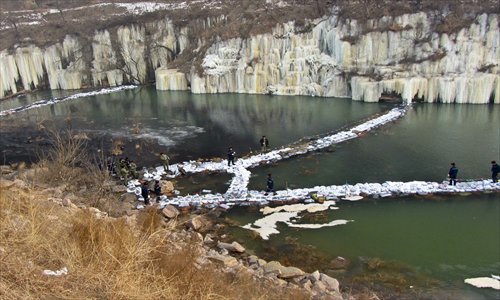Making pollution public

The last day of 2012 brought an unpleasant "gift" to residents near the Zhuozhang River in Shanxi Province, when a chemical plant leaked nine tons of pollutants into the waterway and a further 30 tons into a nearby reservoir.
However, it was not until well into the new year that the local government in Changzhi informed agencies and residents of neighboring cities and provinces, with the delay causing massive threats to their water supplies, as well as an outraged response online.
In the wake of this case, the State Council has released a new notice that has been dubbed the "toughest measure on assessment of water resources management." It demands local governments release information on incidents of water pollution to the State Council without delay.
Governments that are found to have withheld information from the State Council are to be punished administratively and under law; however, the new measure didn't include any specific new provisions on the public disclosure of pollution leaks.
With the 18th Party congress now over, and the environment outlined as a key area for improvement in the new government's term, local governments around the country are keen to show off their green credentials in combating pollution, but old habits die hard - perhaps none more so than the tendency toward secrecy.
Hiding the stains
Authorities in Changzhi on Monday apologized for the five-day delay in reporting the spill that threatened the supplies of drinking water for hundreds of thousands of people, according to the Xinhua News Agency.
"The case revealed the fact that local governments are reluctant to disclose information on the environment and their lack of emergency plans," Xia Jun, a Beijing-based lawyer specializing in environmental issues, told the Global Times.
The Changzhi incident is far from isolated.
One recent case in Northwest China's Gansu Province stands out among recent incidents as one of the most high-profile environmental cases of 2012. In this case, Lanzhou and Yuzhong county governments were sued for not following legal procedure in handling enterprises causing pollution in the region.
A toilet-paper producing company, Baimei Paper, which was on a Ministry of Environmental Protection blacklist for causing serious pollution in 2006, was told to shut down its operations in 2009.
To announce the order, the local government had to overrule an administrative order from the provincial government in 2008, Xinhua reported.
The company launched a lawsuit which it withdrew in 2012 after negotiations resulted in it agreeing to update its equipment to reduce pollution. As part of the agreement, the city and county governments agreed to help the company with economic losses while it put its operations on hold.
"Local governments, in some cases, fail to follow legal procedure when they are eager to control pollution and supervise major polluters. Though their intentions are good, their hands are tied. They have little by way of legal resources at their disposal, because according to the law, they can't act as the plaintiff," Xia said.
Slow progress
"Local environmental protection bureaus mainly control pollution emission through supervising companies. They impose administrative punishments upon polluters or initiate campaigns to control pollution," Wang Jingjing, vice director of the Institute of Public & Environmental Affairs (IPE), told the Global Times.
But in recent times, Wang and her colleagues have been focused on the ways governments are enforcing their responsibility to control pollution, by studying how they treat information related to environmental protection.
After the annual observation of 113 cities nationwide, the IPE discovered that local governments had made some improvements in terms of disclosing environmental information.
In 2011, a mechanism for releasing environmental information to the public was established but still remains a work in progress. The mechanism, which allows governments to release information on polluters in certain cases, has also started to make polluters feel pressured by the public, according to Wang, who added that a more effective method would be to establish a registration system to document pollutants being used in the region.
The city government of Guangzhou, capital of South China's Guangdong Province, released a draft demanding companies install automatic monitoring devices to record the emission of pollutants, especially from key polluting enterprises. The period in which public opinions on the draft can be submitted will close this Friday, China.com.cn reported.
People in more than 70 Chinese cities can now find out more about the air quality in their area as real time reports are collected from nearly 500 monitoring stations nationwide, Xinhua reported on Thursday.
In the meantime, the authorities have beefed up air quality control, and now the number of air-monitoring stations nationwide stand at more than 1,400, twice as many as there were in 2010.
But a recent government report says in the first half of 2012, air quality in 33 cities including Beijing and Urumqi failed to meet the national standard.
"The government now should not only adopt plans dealing with pollution emergencies, but also plans to reduce the long-term environmental impact of pollution on behalf of the public interest," Xia said.